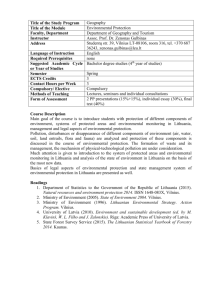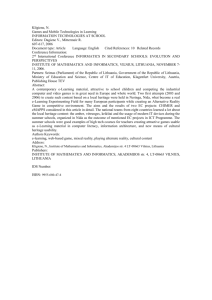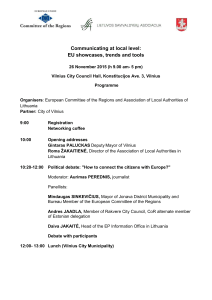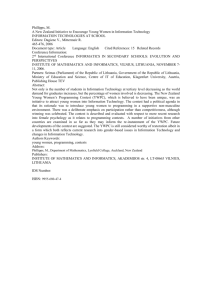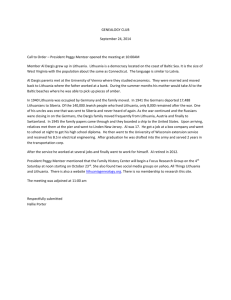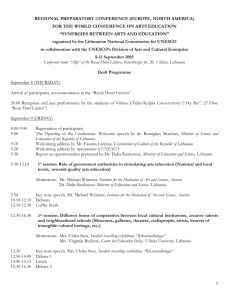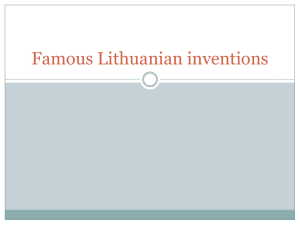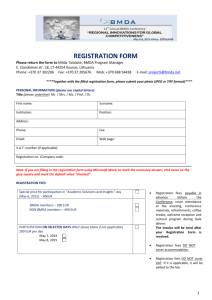Programme Committee
advertisement
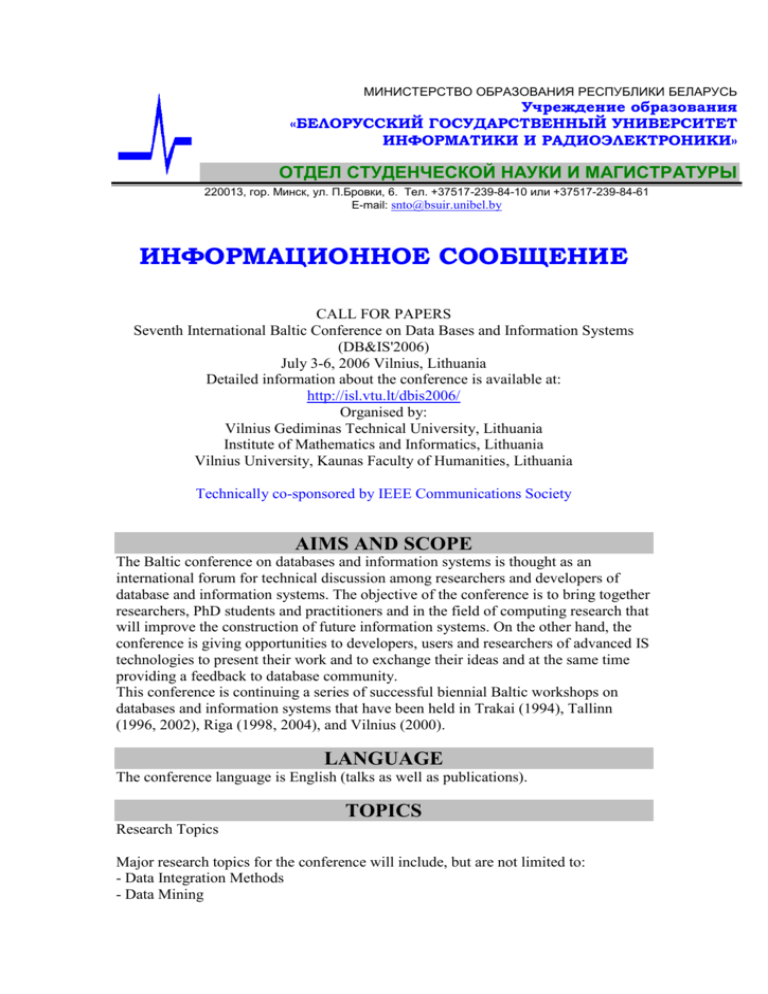
МИНИСТЕРСТВО ОБРАЗОВАНИЯ РЕСПУБЛИКИ БЕЛАРУСЬ Учреждение образования «БЕЛОРУССКИЙ ГОСУДАРСТВЕННЫЙ УНИВЕРСИТЕТ ИНФОРМАТИКИ И РАДИОЭЛЕКТРОНИКИ» ОТДЕЛ СТУДЕНЧЕСКОЙ НАУКИ И МАГИСТРАТУРЫ 220013, гор. Минск, ул. П.Бровки, 6. Тел. +37517-239-84-10 или +37517-239-84-61 E-mail: snto@bsuir.unibel.by ИНФОРМАЦИОННОЕ СООБЩЕНИЕ CALL FOR PAPERS Seventh International Baltic Conference on Data Bases and Information Systems (DB&IS'2006) July 3-6, 2006 Vilnius, Lithuania Detailed information about the conference is available at: http://isl.vtu.lt/dbis2006/ Organised by: Vilnius Gediminas Technical University, Lithuania Institute of Mathematics and Informatics, Lithuania Vilnius University, Kaunas Faculty of Humanities, Lithuania Technically co-sponsored by IEEE Communications Society AIMS AND SCOPE The Baltic conference on databases and information systems is thought as an international forum for technical discussion among researchers and developers of database and information systems. The objective of the conference is to bring together researchers, PhD students and practitioners and in the field of computing research that will improve the construction of future information systems. On the other hand, the conference is giving opportunities to developers, users and researchers of advanced IS technologies to present their work and to exchange their ideas and at the same time providing a feedback to database community. This conference is continuing a series of successful biennial Baltic workshops on databases and information systems that have been held in Trakai (1994), Tallinn (1996, 2002), Riga (1998, 2004), and Vilnius (2000). LANGUAGE The conference language is English (talks as well as publications). TOPICS Research Topics Major research topics for the conference will include, but are not limited to: - Data Integration Methods - Data Mining - Data Models and Database Design - Distributed Database Techniques and Interoperability - Domain Ontologies and Concept-Based Search - Information Systems and Security - Data Warehousing, OLAP, and Knowledge Discovery - Information Systems, Mobile Computing, and Agents - Integrated Information Systems - Intelligent Information Agents - Knowledge Representation and Knowledge Engineering - Knowledge Management - Linguistic Components of Information Systems - Logic and Databases - Metamodels and Model Driven Architecture - Modelling Languages and Tools for Information Systems - Ontology Design Methods - Ontology-Based Information Systems - Knowledge, including business rules, based IS - Requirements Engineering for Information Systems - Web and Databases - XML and Databases Application Topics Application topics of interest include but are not limited to: - Agent-Oriented Approaches to Data Integration - Agents and Knowledge Management - Business Information Systems - Component-Based Systems Development - Business rules based Information Systems development - Database Development Tools - Databases and Data Mining Technologies for Specific Domains (Bioinformatics, etc.) - E-Commerce and Database Technology - Geographic Information Systems - Information Systems and Artificial Intelligence Technologies - Information Systems Development Tools - Integrated and Interoperable Database Technologies - Intelligent Information Access - Legal Information Systems - National Information Infrastructure Development - Ontologies in Agent-Oriented Information Systems - Regional Infrastructure Information Systems and Database Applications - Web Information Systems Strong research papers are encouraged even if topic does not exactly match those mentioned above. SUBMISSION Original research papers as well as application experience papers up to 5000 words should be submitted in electronic form (Standard Postscript, PDF, RTF, DOC) via electronic paper submission system by the submission deadlines (see below). All submissions must be original, not presented at other conferences, published or under publication elsewhere. Papers will be reviewed by at least two referees Paper format requirements are specified at http://isl.vtu.lt/dbis2006/ All papers are to be submitted electronically to http://isl.vtu.lt/dbis2006/ Additionally, for each paper should be submitted abstract (up to 500 words) with the list of keywords to facilitate the assignment of papers to referees. We have provided a webbased submission procedure, which is an easy and user-friendly way to submit your paper. Conference management system is described at http://isl.vtu.lt/dbis2006/SosunovasVasilecasKonfIS20040826.doc PUBLICATIONS It is planned that selected papers will be published by Springer in LNCS or by IOS Press in volume of “Frontiers in Artificial Intelligence and Applications” journal (negotiation is in process). Other accepted papers will be published in conference proceedings (under an ISBN) by Vilnius Gediminas Technical University and distributed at the Conference. Conference proceedings will be included into IEEE Xplore data base http://www.ieee.org/ieeexplore. We are also negotiating with some conference topics related journals to publish extended versions of selected Baltic DB&IS'2006 papers. WORKSHOPS “Information Technology for business” workshop will be held together with conference. http://www.vukhf.lt/index.php?url=english/works_of_faculty/conferences/baltic_dbis_2006 DOCTORAL CONSORTIUM To activate and motivate PhD students the conference programme will include Doctoral Consortium chaired by invited professors. PhD students are invited to submit research communications up to 4000 words describing their current work. To be eligible, all authors of the paper must be students (except possibly their advisors). The papers should be in line with the main conference topics. The papers will be reviewed and selected by Programme Committee. Selected papers will be published in communications. PANEL AND TUTORIAL PROPOSAL Proposals are invited AWARDS The best conference paper will be awarded (conference diploma and a gift from Vilnius). The best paper authored solely by students (up to master level) will be awarded (conference diploma and gift from Vilnius). Please indicate in your submission, whether it is a student paper. IMPORTANT DATES Abstracts: January 23, 2006 Papers: January 30, 2006 Reviews: March 13, 2006 Notification of acceptance: April 3, 2006 Camera-ready papers: April 15, 2006 Conference dates: July 3-6, 2006 GENERAL INFORMATION For general information, please send email to dbis2006@isl.vtu.lt CONFERENCE VENUE The conference will be held at the Vilnius Gediminas Technical University in Vilnius, Lithuania. Lithuania is a small, beautiful country lying in the East Europe, on the south eastern coast of the Baltic Sea and inhabited by one of the Baltic nations. The Lithuanians have preserved one of the oldest language, a unique culture and unique customs. Lithuania is in the zone of temperate climate, its average annual temperature is about 6 degrees Centigrade (in June +17 degrees). There are about 4000 lakes in Lithuania, 21 rivers, Lithuania's forests occupy 28,4 per cent of the country. The fauna of Lithuania is similar to north-western Europe and taiga. Vilnius is the capital of Lithuania. It is a city that has to be explored. A day walking through the narrow, winding streets will give you a lot of impression. There is plenty to see. Masterpieces of local gothic, baroque and classicism, Gediminas Castle, folk art, museums, monuments of the former Soviet Empire, restful cafes, swinging bars, modern night clubs, handsome and imposing restaurants. The largest Old Town in Eastern Europe gives you the feeling that you are walking through a museum, for practically every building is a relic of a sort. Behind the scenes the Lithuanian capital counts some thousands of courtyards in all architectural styles from the 14th to the 19th century. 27 km from Vilnius lays the ancient capital of Lithuania Trakai. The Trakai Castle, an original relic of the Middle Ages, has survived on one of the islands on the Galve Lake to this day. 100 km from Vilnius lays the Lithuania's second largest city Kaunas. There is a number of interesting museums, such as the Ciurlionis Museum with an exposition of more than 200 canvases by the great Lithuanian artist M.K. Ciurlionis and the exposition of folk "devil" sculptures. CONFERENCE ORGANISATION Advisory Committee Janis Bubenko, Royal Institute of Technology, Sweden Arne Solvberg, Norwegian University of Science and Technology, Norway Programme Co-Chairs Albertas Caplinskas, Institute of Mathematics and Informatics, Lithuania Johann Eder, University of Vienna, Austria Olegas Vasilecas, Vilnius Gediminas Technical University, Lithuania Programme Committee Witold Abramowisch, Poland Viktor Aleksejev, Byelorussia Majed Al-Mashari, Saudi Arabia Marko Bajec, Slovenia Janis Barzdins, Latvia Maria Bielikova, Slovakia Juris Borzovs, Latvia Sjaak Brinkkemper, Nederlands Bostjan Brunen, Slovenia Janis A. Bubenko, Sweden Rimas Butleris, Lithuania Sharma Chakravarthy, USA Lawrence Chung, USA Cesar Alberto Collazos, Colombia Jose Cordeiro, Portugal Heitor Augustus Xavier Costa, Brazil Bogdan Czejdo, USA Oguz Dikenelli, Turkey Dale Dzemydiene, Lithuania Hans-Dieter Ehrich, Germany Andre Flory, France Maria Grazia Fugini, Italy Franca Garzotto, Italy Janis Grundspenkis, Latvia Giancarlo Guizzardi, Italy Hele-Mai Haav, Estonia Juhani Iivari, Finland Mirjana Ivanovic, Serbia and Montenegro Leonid Kalinichenko, Russia Ahto Kalja, Estonia Audris Kalnins, Latvia Marite Kirikova, Latvia Gábor Knapp, Hungary Christian Koncilia, Austria Manolis Koubarakis, Greece John Krogstie, Norway Rein Kuusik, Estonia Sergej Kuznetsov, Russia Patrick Lambrix, Sweden Michael Lang, Ireland Pericles Loucopoulos, UK Audrone Lupeikiene, Lithuania Kalle Lyytinen, USA Leszek Maciaszek, Poland Yannis Manolopoulos, Greece Rainer Manthey, Germany Saulius Maskeliunas, Lithuania Mihhail Matskin, Sweden Kai Mertins, Germany Audris Mockus, USA Lina Nemuraite, Lithuania Jorgen Fischer Nilsson, Denmark Kjetil Norvag, Norway Boris Novikov, Russia Algirdas Pakstas, UK Oskar Pastor, Spain Jaan Penjam, Estonia Klaus Pohl, Germany Jaroslav Pokorny, Czech Republic Henrikas Pranevicius, Lithuania Boris Rachev, Bulgaria Daniela Rosca, USA Gunter Saake, Germany Simonas Saltenis, Denmark Klaus Dieter Schewe, New Zealand Joachim Schmidt, Germany Timothy K. Shih, Taiwan Rimvydas Simutis, Lithuania Guttorm Sindre, Norway Eva Söderström, Sweden Arne Solvberg, Norway William Song, UK Janis Stirna, Sweden Julius Stuller, Czech Republic Ernest Teniente, Spain Bernhard Thalheim, Germany Enn Tyugu, Estonia Irma Valatkaite, Lithuania Gottfried Vossen, Germany Benkt Wangler, Sweden Robert Wrembel, Poland Mudasser Wyne, USA Tatyana Yakhno, Turkey Arkady Zaslavsky, Australia Roberto Zicari, Germany Organising Chair Olegas Vasilecas, Vilnius Gediminas Technical University, Lithuania Organising Committee Algirdas Ciucelis, Vilnius Gediminas Technical University, Lithuania Ahto Kalja, Institute of Cybernetics at TTU, Estonia, coordinator for Estonia Juris Borzovs, Institute of Mathematics and Computer Science, Latvia, coordinator for Latvia Algirdas Pakstas, London Metropolitan University, UK – IEEE Liaison Sergiejus Sosunovas, Vilnius Gediminas Technical University, Lithuania Saulius Maskeliunas, Institute of Mathematics and Informatics, Lithuania Dalia Dzemydiene, Institute of Mathematics and Informatics, Lithuania Audrone Lupeikiene, Institute of Mathematics and Informatics, Lithuania Diana Bugaite, Vilnius Gediminas Technical University, Lithuania Virgilijus Sakalauskas, Vilnius University, Lithuania Rimvydas Simutis, Vilnius University, Lithuania Dalia Kriksciuniene, Vilnius University, Lithuania
